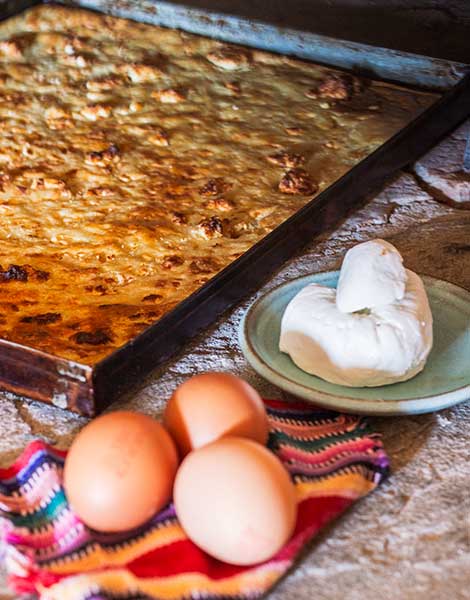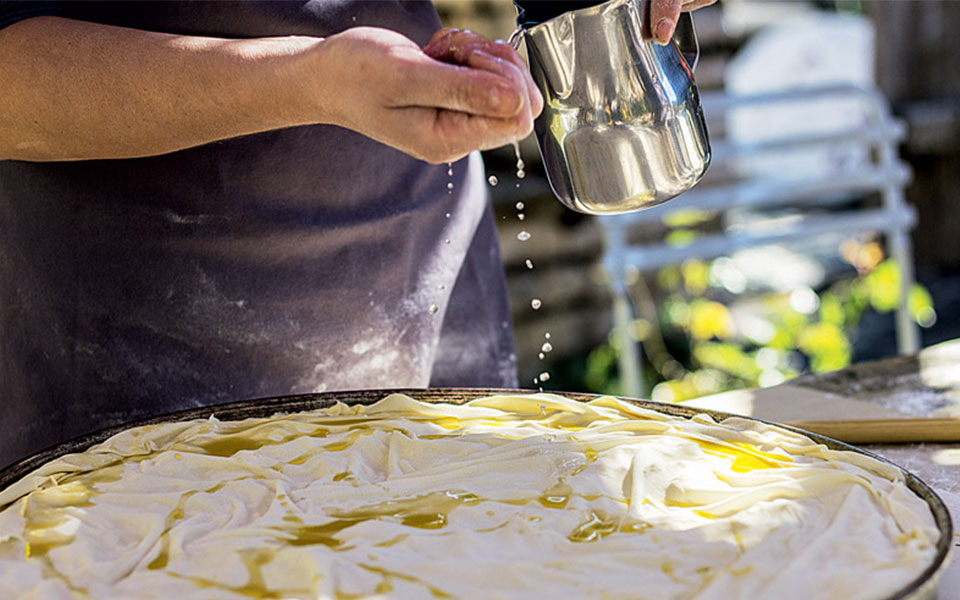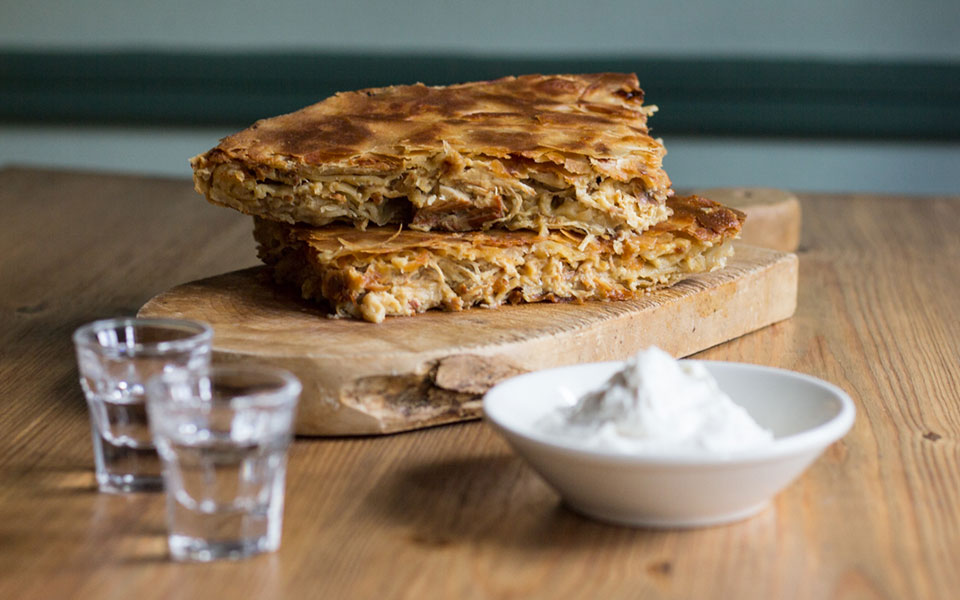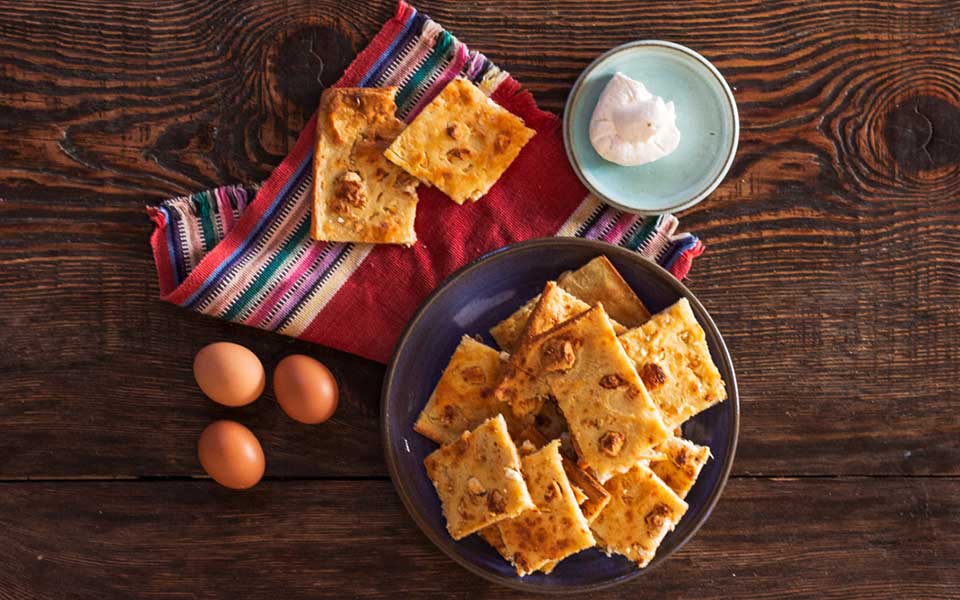Ten Dishes Worth the Table: Where to Eat...
We’ve compiled ten of the tastiest,...

© Alexandros Antoniadis
When it comes to the cuisine of Epirus in the northwest of Greece, savory pies (“pites” in Greek) are undoubtedly the star of the show. Peek through kitchen windows in the villages of the Pindus mountain range, in the impressive highlands of Epirus, and you’re likely to spot more than a few elderly women, scarves on their heads, kneading and spreading dough for pies.
These women, giving and generous, put their hearts and souls into making these delicious preparations.
“We ate pie every day except for Thursdays and Sundays; on Thursdays, we ate stuffed zucchini blossoms, and on Sundays, a bit of meat with pinto beans,” Thucydides Papageorgiou remembers. Papageorgiou is from the village of Kapesovo in the Zagori region of Epirus; he’s also a modern-day alchemist, a winemaker, and the author of the book “An Expensively Won Life” (self-published, 2015), which describes the agricultural economy and everyday life in Kapesovo.
Baking pies used to be a way of making food go further: pies made using only a small quantity of trahana or lentils, enough for one portion of food on their own, could feed up to four people. Pretty much everything was turned into a pie in the Epirus region; wild greens pies, nettle pies, leek pies, pumpkin pies – sweet or savory – cheese pies, and herb pies made with cornmeal instead of filo pastry were all included in the normal diet of locals.

In the stone-built villages of the mountains of Epirus
© Alexandros Antoniadis

Just a few ingredients is all it takes to make a delicious Epirote pie
© Alexandros Antoniadis
Sweet rice pie made with sugar, raisins and cinnamon was traditionally offered to women who had recently given birth; you’d also find it at engagement parties and other celebrations.
However, the “official” pie served at most of these events was a meat pie made with just mutton and onions. I tried it recently, and it may well be the most delicious pie I’ve ever tasted. All the mastery in such pie-making lies, of course, in preparing the dough and in making sure the layers of dough in the middle of the pie cook correctly and don’t get soggy.
A meat pie is also traditionally served on New Year’s Day, with a coin baked inside it to bestow a year’s luck on the one who finds it in their slice. Some keep the pie “open,” others cover the top with a layer of filo pastry.
Often, the cook folds back the dough that extends over the sides of the tray to form a ring around its edge so that when the pie comes out of the oven, it is wearing a “kothro” – a crown of extra crust. Pies were also often baked in a cooking pot that was placed under an improvised stove made from a steel plate covered in coals and ashes, which created the ideal slow cooking conditions.
One of the characteristics of the local cuisine is that recipes and cooking techniques differ significantly from one village to the next. Tsepelovo residents, for example, may have never heard of the lentil pie made in the village of Kapesovo.
However, all Zagorians agree that when it comes to alevropita, a flour pie which is their most popular, there’s no single authoritative recipe; some locals make it with just flour, water and cheese, while others add oats, eggs, milk and cheese. In short, every home has its own way of preparing it. What’s more, the unit of measure involved in preparing it is the rather vague “blohero” – which means “a good handful.”
Today, all these savory pies, which during years of penury were products of necessity, have become items of luxurious indulgence and, of course, a gauge for the cooking skills of whoever puts them on the table.

© Alexandros Antoniadis
Making the Dough and Filo Sheets
Don’t be too worried if your first attempt at making one of these pies isn’t a rousing success. The hardest part of the recipe is the handmade filo pastry, but that’s also what makes the whole difference in the dish.
The temperature of each ingredient, of the room and even of your own hands affect the dough’s elasticity. How much water you need to add depends on the quality of the flour, so don’t pour it all in at once – do it slowly and gradually, as the actual amount required can vary from 380ml to 500ml.
You may need to put a small quantity of flour on your hands, too, to keep the dough from sticking to your fingers, but don’t overdo it, as your mix may become too firm. Apply the general rule for kneading, and work the dough for 10 to 12 minutes, until it becomes soft and fluffy.
Steps:
Pour the flour in a large bowl. Add the salt and form a cavity at the center of the mix.
Pour the tsipouro, along with a small quantity of water, inside the hole and try to incorporate the flour into the mixture that forms.
Slowly, and in small quantities, add water and continue stirring until the dough is relatively soft and sticky.
Start pouring the olive oil in gradually and continue kneading persistently with your fists for about 10 minutes, until the dough is smooth and no longer sticky.
If necessary, add a small quantity of water or flour.
Scrape all the dough from the walls of the bowl. (There shouldn’t be any flour left in the bowl when you are done kneading.)
Form the dough into a large ball, cover it with a towel and let it sit for 30 minutes.
Depending on how many sheets you want, split the batter into 10-12 small spheres of approximately the same size and, using a rolling pin, roll each one of them out into a thin sheet.
Basic dough for fresh puff pastry (for twelve 40cm diameter layers or ten 50cm diameter layers)

Chicken Pie
© Alexandros Antoniadis
Yiorgia’s Chicken Pie
The guesthouse/taverna Zisis in Aristi (tel. +30 265.304.1088) has been operating out of a wonderfully preserved old building since 1980; it serves local cuisine in an inviting space decorated with antiques.
On the autumn day that I visited, the courtyard of the restaurant reminded me of the French countryside. I met with Yiorgia Kiakou, cook and co-owner with her husband, Alkis Zisis, of the business.
Yiorgia made us an unforgettable pie and shared the recipe, which requires only two main ingredients. The proportions are easy to remember, too; you need a chicken or rooster weighing a kilo, and a kilo of onions.
Preparation: 1 hour, Cooking time: 80 min
Steps
For the pie filling:
Heat the oil in a large pan and sauté the chicken for 3-4 minutes until brown on all sides.
Throw in the onions and sauté for 3-4 minutes until golden. Add 500ml water, some salt, pepper, and cook at low heat for approximately 30 minutes.
Remove from the heat, take the chicken out and de-skin and de-bone the meat.
Place the onions and the remaining juices from the pan in a large bowl and let cool.
In a smaller bowl, beat the eggs and incorporate them into the onions. Add the clean slices of chicken and stir. Pre-heat the oven to 200°C (fan-assisted mode).
Place a 50cm diameter (or slightly smaller) oven dish upside-down inside the oven, oil its top surface and place one of the thin sheets of dough on it. Leave for about 3 minutes until the dough sheet is slightly dry and crispy. Be careful not to burn it. Repeat with a second dough sheet, and put them to the side.
Remove the oven dish, clean the exterior bottom surface, and oil the interior bottom surface.
Place an uncooked sheet of dough down into the dish, letting its edges hang over the sides.
Add ⅓ of the filling to the dish and then place one of the two cooked dough sheets on top. Add ⅓ more and repeat with the second crispy dough sheet. Add the last third of the filling and then cover with another uncooked layer.
Smear the surface with oil and top off with the last uncooked sheet of dough.
Fold all hanging dough edges towards the inside of the dish and form the “kothro” – the crown made of crust – by doubling them over and pinching them into place.
Cook for approximately 50 minutes, or until brown.
Let the pie cool for a while before serving.

Flour pie
© Alexandros Antoniadis
Lila’s flour pie
Co-owner of the Anemi guesthouse in Kato Pedina, Lila bakes this easy-to-make pie almost every day and serves it to her guests for breakfast. Flour pie is so simple to make that she doesn’t need to wake up much earlier than her clients – it requires no more than 50 minutes.
Steps:
Grease a shallow pan and place it in the oven. Heat the oven to 250°C.
In a large bowl, pour in the flour, the milk and the water; stir using a whisk until the mixture is blended.
Incorporate one egg, some salt and the olive oil.
Take the hot pan from the oven and pour the mixture in.
Coarsely chop the feta cheese and spread it on top of the mixture.
Add two beaten yolks and scatter the butter, cut into small pieces, across the top.
Cook for 50 minutes.
Remove from the oven when the edges of the pie are well cooked and crispy.
Enjoy it hot, or let cool it before serving.
We’ve compiled ten of the tastiest,...
A traditional honey-and-cheese pie from Mykonos,...
Discover five of Athens’ latest openings,...
In a summer of soaring prices,...